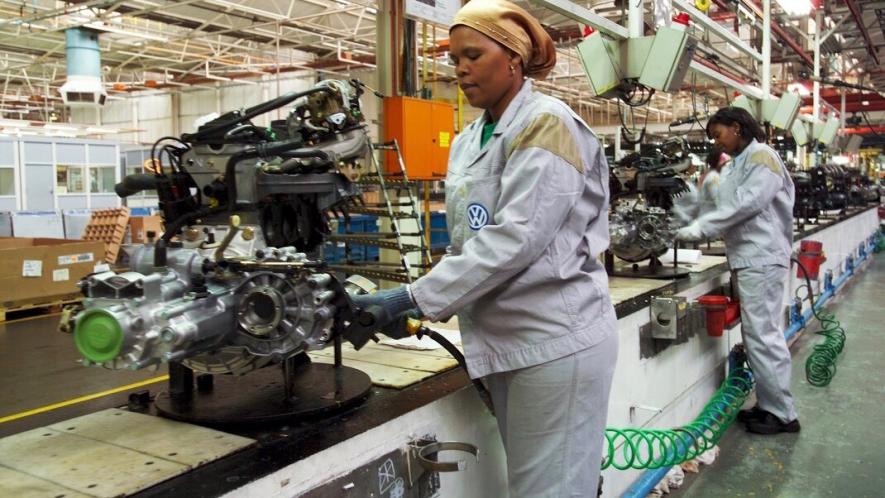Volkswagen South Africa Reinstates Shop-stewards After Pressure from Union

Workers on the production line of Volkswagen’s Uitenhage plant in South Africa. (Photo: Brand South Africa)
On August 11, Tuesday, Volkswagen South Africa announced that it will reinstate 14 shop-stewards who were suspended for exposing COVID-19 protocol violations at the company’s Uitenhage plant.
The German automobile giant agreed to reinstate the shop-stewards in a meeting after the National Union of Metalworkers of South Africa (NUMSA) – which represents close to 2,600 of Volkswagen’s roughly 3,900 workers nationwide – threatened to take the company to labor court over the issue.
NUMSA alleges that workers of the Volkswagen plant at Uitenhage, an industrial town in the Eastern Cape Province, were exposed to unsafe conditions after being required to return to work on May 4 following the easing down of lockdown restrictions. The plant had been shut since March.
No risk assessment has been conducted since the plant’s reopening, NUMSA national spokesperson Phakamile Hlubi Majola told Peoples Dispatch.
The union claimed that while industries were allowed to operate with only 50% of the workforce, the full force of workers was deployed by Volkswagen at the Uitenhage plant during the morning and afternoon shifts. This prevented the maintenance of required physical distancing measures.
Even after some workers tested positive for COVID-19, no deep-cleaning was conducted at the plant, which led to rapid spread of the infection. NUMSA further alleged that many workers who had to self-isolate themselves were summoned back to the production line even before their test results were confirmed negative.
“Instead of.. addressing its unlawful and irresponsible actions, (the company).. insisted that workers were being infected in their communities and not at work,” NUMSA general secretary Irvin Jim said in a statement last week.
According to Jim, Volkswagen also manipulated its sick leaves policy, stipulating that any worker who “contracted the virus outside of the workplace, is not entitled to special sick leave, and periods of isolation or quarantine are taken off normal annual leave.”
“In fact, at this point in time.. [Volkswagen] is disciplining employees who are close to exceeding their annual sick leave entitlement,” he added.
As a result, workers feared loss of pay if they tested positive and had to be quarantined, and based on this policy, exceeded their annual limit on regular sick leaves. Due to their already difficult economic circumstances, many workers chose not to disclose symptoms and continued working quietly.
Barely two months since production resumed in May, a worker succumbed to the disease on June 3. By July 17, 120 of the plant’s 546 workers were under isolation after testing positive. Another 60 were quarantined with symptoms, and were awaiting results.
Workers tried to raise their concerns with the company’s human resource manager, however, he refused to meet them, saying it “presented a risk to his health,” according to Jim. The managers and the white-collared staff of the plant were working from the safety of their homes all this while.
Eventually, as the situation became untenable, at around 10 a.m on July 17, workers began to walk out, refusing to risk their lives and that of their families any longer.
No production took place on July 17, with the workers refusing to return until their safety concerns were addressed. The management termed this walkout a strike, despite the union’s insistence that it was not.
Any strike action undertaken without advance notice and before exhausting the dispute resolution mechanisms prescribed in South African labor law is “unprotected”, which means that employers can dismiss the striking workers. Volkswagen threatened to lockout and dismiss all the workers, forcing them to return to work the following day.
In the meantime, NUMSA’s shop-stewards at the plant brought the issue to the attention of the Department of Employment and Labor. After three inspections, the department confirmed on July 22 that there were violations on the company’s part, Hlubi Majola said. The final report on the findings is pending.
Under the department’s pressure, Volkswagen was forced to address many of the issues. However, in what the union alleges to be an act of retribution, the company suspended 14 of the shop-stewards who, according to Jim, “were intimately involved in.. (the Department’s) investigations.”
Their removal “will allow (the) management to carry on acting with impunity by exposing workers to an unsafe workplace,” Jim claimed. In response, NUMSA stated that it was prepared to drag Volkswagen to labor court. Under threat of legal action, the plant’s management met the suspended shop-stewards on August 11, and agreed to reinstate them.
“We will continue to engage the management at plant level” to resolve the concerns over safety, Hlubi Majola said.
This behavior of Volkswagen was “not an isolated incident. Many workers are suffering in silence because they fear being victimized by employers for speaking against the non compliance with (Occupational Health and Safety Act)”, said the secretariat of the National Education Health & Allied Workers’ Union (NEWAHU) in a solidarity statement last week.
“Workers need to be united more than ever to decisively defeat employers who are hell-bent on obliterating them because of their insatiable demand for profits,” said NEWAHU.
Peoples Dispatch has reached out to Volkswagen South Africa via email, and the article will be updated to reflect any response the company may give in due course.
Get the latest reports & analysis with people's perspective on Protests, movements & deep analytical videos, discussions of the current affairs in your Telegram app. Subscribe to NewsClick's Telegram channel & get Real-Time updates on stories, as they get published on our website.














